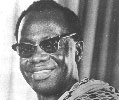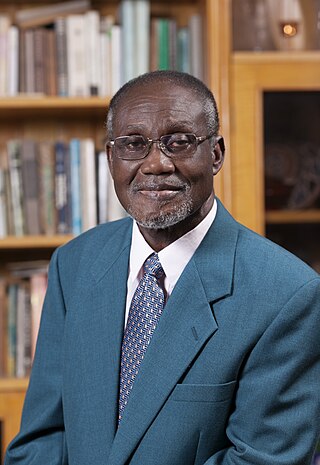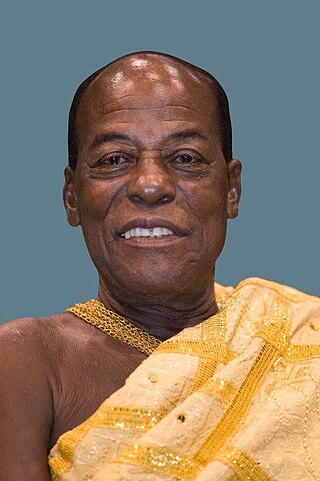Related Research Articles

Kofi Abrefa Busia was a Ghanaian political leader and academic who was Prime Minister of Ghana from 1969 to 1972. As a leader and prime minister, he helped to restore civilian government to the country following military rule. He declared support for apartheid South Africa's white minority government.

Obed Yao Asamoah is a Ghanaian lawyer, academic and politician. Asamoah was the longest serving foreign minister and Attorney General of Ghana under Jerry Rawlings from 1981 to 1997. Asamoah was educated at King's College London and at Columbia University.
Ernest Eggay Kwesi Kurankyi-Taylor was a prominent Ghanaian judge and activist.
Victor Owusu was a Ghanaian politician and lawyer. He served as Attorney General and Minister for Justice on two occasions which were under the NLC and then Busia regime and also became Minister for Foreign Affairs under the Busia regime. He was the Popular Front Party's presidential candidate for the 1979 Ghanaian general election.
Nicholas Yaw Boafo Adade (1927–2013) was a former supreme court judge and Attorney-General of Ghana. He was first appointed to the Supreme Court in 1980 and became acting chief justice from 1990 to 1991. He was the Attorney General of Ghana between April 1969 to February 1971 in the National Liberation Council administration and Busia government. He was Member of Parliament for Asante Akim South constituency under the Second Ghanaian Republic.
Kwabena Gyima Osei-Bonsu was a lawyer and Ghanaian Politician and a member of the first parliament of the second Republic representing the Asokwa Constituency in the Ashanti Region of Ghana. He was a minister of state in the Busia government.

Nana Kwame Akuoko Sarpong, is a traditional ruler, a politician and a lawyer. He is the paramount chief or Omanhene of the Agogo Traditional Area of Ghana. He served as Secretary for Health, Secretary for Internal Affairs and Secretary for Chieftaincy Affairs in the PNDC government. He also served as a member of the council of state in the fourth Republic.
Mohammed Abdul-Saaka was a Ghanaian politician. He was a deputy minister in the second republic. He served as deputy minister for defence and later deputy minister for internal affairs.
Solomon Osei-Akoto was a Ghanaian politician. He was member of parliament for Birim-Abirem from 1969 to 1972 and also served as ministerial secretary for transport and communication under the Busia regime.
Joseph Yaw Manu was a Ghanaian civil servant and politician of the First Parliament of the Second Republic representing the Mampong South Constituency in the Ashanti Region of Ghana. He was a deputy minister for transport during the second republic.
Alexander Apeatu Aboagye da Costa was a Ghanaian lawyer and politician. He was the deputy minister for Youth and Rural Development, and deputy minister for Labour and Co-operative during the second republic
Akenten Appiah-Menka was a Ghanaian lawyer, politician and businessman. He was the deputy minister for trade and industry and later deputy attorney general in the second republic.
John Kofi Fynn was a Ghanaian academic and politician. He was an emeritus professor of history at the University of Ghana and a deputy minister of state in the Busia government. He served as deputy minister for local government and administration and later deputy minister for education.
Justice Akuamoa Boateng was a Ghanaian civil servant and politician. He served as a deputy minister of state in the second republic.
George Adjei Osekre was a Ghanaian lawyer and politician. He was a barrister-at-law, a member of parliament for the Kpeshie constituency during the second republic and Ghana's ambassador to Egypt from 1980 to 1981. He was Executive Chairman of Accra Hearts of Oak S.C. from 1971 to 1975.
Kofi Gyemfi II was a Ghanaian politician, ex-serviceman, and hotelier. He was a member of the Parliament of Ghana for Atwima Amansie during the first Parliament of the Second Republic of Ghana. He served in the Ghana Armed Forces during World War II and managed and owned various hotels throughout his life.
Thomas Kwame Aboagye was a Ghanaian lawyer and politician. He was a deputy minister for defence during the second republic, and the member of parliament for the Subin Constituency during the Second and Third Republics.
Kofi Badu was a Ghanaian politician and journalist. He served as a member of parliament during Ghana's first republic and a minister of state during the Supreme Military Council (SMC) era and the Armed Forces Revolutionary Council (AFRC) era. As a journalist, he was editor for various newspapers.
Kwame Poku Agyekum was a Ghanaian politician and member of the first parliament of the second republic of Ghana. He represented the Amansie Central constituency in parliament on the ticket of the Progress Party.
Anane Antwi-Kusi was a Ghanaian politician and member of the first parliament of the second republic of Ghana representing Tano constituency under the membership of the Progress Party.
References
- ↑ "Telephone Directory". National government publication. 1974. p. 171.
- ↑ Martinson, H. B. (2001). Ghana: The Dream of the 21st Century : Politics of J.B. Danquah, Busia and Kufuor Tradition. Norcento Press. p. 71. ISBN 9789988776763.
- 1 2 3 Danquah, Moses (1969). "The Birth of the Second Republic". p. 104.
- ↑ Baildon, W. P.; Walker, J. D.; Roxburgh, Ronald (2001). The Records of the Honorable Society of Lincoln's Inn: 1914–1965. Lincoln's Inn. p. 785. ISBN 9780954061906.
- 1 2 Osei, J. K. (1974). "Your Guide to the Kumasi City". p. 50.
- ↑ Agyemang, Eddie (12 July 1969). "No Case Against Mrs. Edusei: Counsel Submits". Daily Graphic. Retrieved 12 May 2019.
- ↑ "Ghana Bar Bulletin, Volume 1". Ghana Bar Association. 1988. p. 93.
- ↑ "Ghana Year Book". Graphic Corporation. 1970. p. 55.
- ↑ "The Legon Observer, Volume 4, Issues 18–26". Legon Society on National Affairs. 1969. p. 8.
- ↑ "Parliamentary debates : official report". Ghana Publications Corporation. 1970. p. 433.
- ↑ "Ghana Year Book 1971". Graphic Corporation. 1971. p. 53.
- ↑ "Ghana Business Guide". Business Publications. 1969. p. 6.
- ↑ Ghana : 50 years of independence. 2013. ISBN 9781462837618.
- ↑ "Political Handbook and Atlas of the World". Council on Foreign Relations. 1973. p. 45.
- ↑ Taylor Assets Committee (1976). Report of the Taylor Assets Committee Appointed Under N.R.C. (investigation and Forfeiture of Assets) Decree, 1972 (N.R.C.D. 19) to Enquire into the Assets of Scheduled Persons, Volume 1, Issue 1. p. ii.
- ↑ "Africa Research Bulletin: Political, social, and cultural series, Volumes 16–17". Blackwell. 1979. p. 5231.
- ↑ "Sub-Saharan Africa Report, Issues 31–36". Foreign Broadcast Information Service. 1986. p. 19.
- ↑ Hasty, Jennifer (2005). The press and political culture in Ghana. p. 171. ISBN 0253111358.
- ↑ "Ghana Newsletter, Volume 8". Dutch Ghana Committee. 1989. p. 10.
- ↑ Hasty, Jennifer (1991). Worse than South Africa : hypocrisy in African politics. p. 117. ISBN 9780951801307.